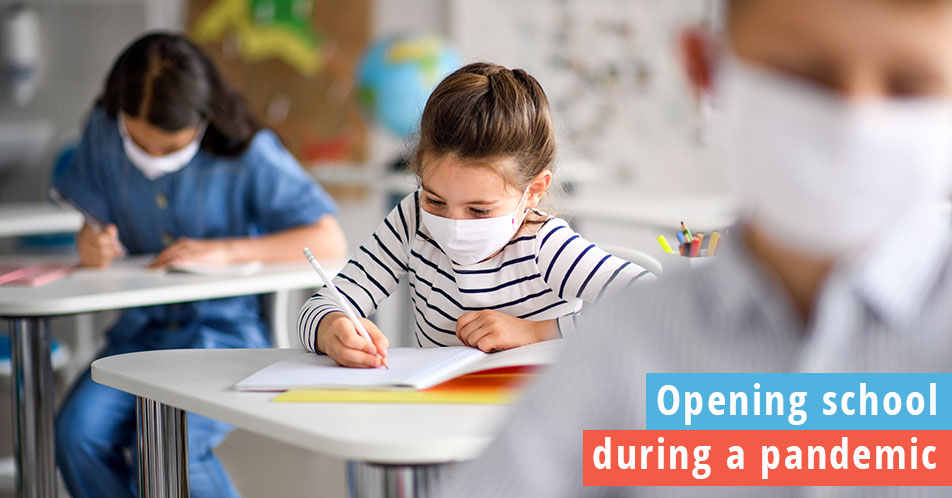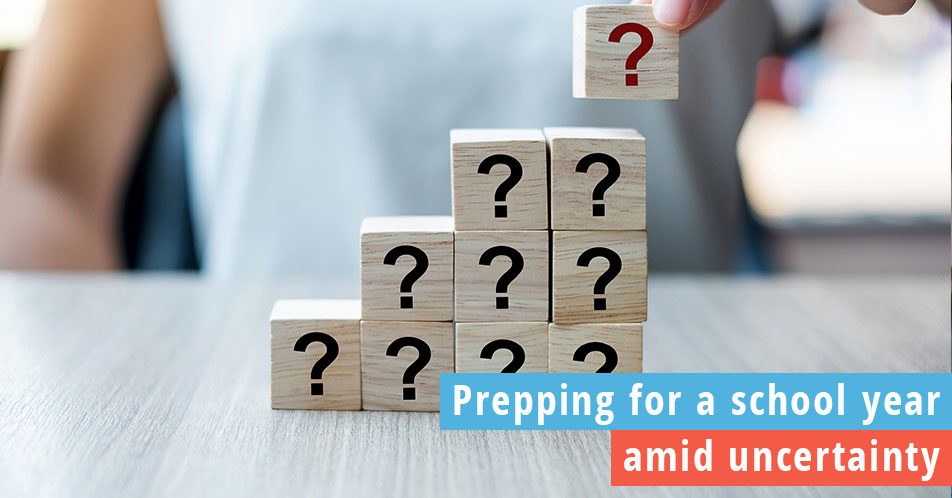Host Joel Gagne talks with Dr. Matthew Montgomery, Superintendent at Revere Local Schools, about opening school during a pandemic
Revere Local Schools are fully open and has been for a few weeks, unlike their counterpart whom we heard from last week on our podcast featuring Olmsted Falls City Schools, which is fully remote. Joel and Dr. Montgomery, Superintendent of Revere Local Schools, discuss the pressure on superintendents while making decisions about opening school during a pandemic.
Joel starts by explaining that he wanted to see the flip side to going fully remote since Revere Local Schools are fully open.
Dr. Montgomery starts by giving a bit of background about Revere Local Schools. Their suburban district in northeast Ohio is small with about 2,800 students.
“Over the last five years, we’ve really been focusing on curriculum and instruction,” Dr. Montgomery says. “We’ve also been working with future-ready schools and Apple to really focus on tech integration, which has proved most beneficial since March in trying to transition very quickly from brick and mortar to remote during the springtime.”
He continues to explain that they’re wrapping up a 4-year $86 million construction project that touched every facet of their district.
“We spent a lot of time on space and that complements instruction quite well and it opens up opportunities for innovation,” Dr. Montgomery says.
He says that now they’re partnering with Battelle for Kids to create a Portrait of a Graduate, which they’re calling a Vision of a Minuteman. The next step will be to work on strategic planning to reflect on the last five years and how much has changed in that time and how to move forward toward the future.
“I can’t think of a more appropriate time in modern history to pause and reflect and hopefully reimagine what we want for school moving forward,” Dr. Montgomery says.
Joel commends the building project and how it’s a great time to have extra space, which is in very high demand right now. He asks how the community and staff have adjusted to fully opening school during a pandemic.
Dr. Montgomery says that while they haven’t returned to “normal,” the community has responded overwhelmingly positively to being fully open.
“Eight-seven percent of our families have decided to put their students in brick and mortar,” Dr. Montgomery says. “Thirteen percent selected the remote option.”
He says that they’ve been surveying parents regularly, and the most recent survey showed that an overwhelming majority of parents said that their children felt safe being in school in person.
“We have been leaning on community feedback to develop these plans because ultimately it is their schools,” Dr. Montgomery says. “We’ve created a plan that meets the needs of our community while still maintaining safety.”
As for the staff, he says that there have been concerns regarding returning in person, and some would much rather be in hybrid or remote learning. He explains that a lot of school administrators are facing a 50/50 split on how people want to open school.
“Moving forward, there’s a lot of pressure out there on school administrators to have this all buttoned up and ready to go, and you know that this is a public enemy,” Joel says. “A lot of school districts did the best that they could, but you just can’t easily pivot quickly.”
Joel asks what Dr. Montgomery believes that school districts need to be successful during the era of COVID-19.
“Expectations need to be realistic as possible,” Dr. Montgomery says. “We are not out of the pandemic yet. Our theme is adapt and adjust. We need to be able to pivot and be nimble.”
They both agree that schools are resistant to change, so it’s been amazing and impressive that school districts have been able to adapt so well in the last year during the pandemic.
Dr. Montgomery says that right now is the perfect time to pause, reflect and work to figure out what schools need to do to operate at a high level of excellence. He’s hopeful that when this is in over, in whatever way this ends, he hopes that school administrators can come out of this having learned a lot of lessons on how to lead even better.
“I don’t know what November is going to look like. I don’t know what happens when flu season is here,” Dr. Montgomery says. “It could be possible that we need to address needs in a new way.”
He also says it’s important to recognize that students who transition from learning remotely to learning in person will need to be more or less backfilled with information to address the holes that happen during remote learning regardless of how well it’s executed.
Joel asks if the flu season does pick up along with more COVID cases, will Revere Local Schools be ready to go fully remote again?
“We’re much better prepared to be remote now than in the spring,” Dr. Montgomery says. “We did a good job in March under the circumstances, but we have learned that we can do a much better job, and we’ve had the time to work on what we should improve.”
He says they’re lucky to be a district that’s 1:1 with technology, and fortunately most families have good internet connections. He says for them a big concern is that students are doing emotionally and socially well when they need to be learning remotely.
He says that a big push for him to going fully in-person related to the risks involved with students being remote, such as increased risks of abuse and suicide. He’s hopeful that they have good safety nets in place this time around in case they do go fully remote again.
Joel closes out the podcast by asking Dr. Montgomery what he wants others to know about what school administrators are going through during this era.
“I think the first thing is that I want people to know that our administration is doing the very best to keep students safe while providing them that opportunity to be in school, which is where we know they thrive,” Dr. Montgomery says. “Although we couldn’t please everybody, I think we made the right decisions for the kids we educate.”
He says that this has been a time of unprecedented levels of high stress for school administrators.
“If we can all remember that in this polarized world, a little kindness goes a long way,” Dr. Montgomery says. “The way in which someone approaches the presentation of the problem can drastically change the experience for that individual and for the person trying to problem solve.”
He says the vitriol that’s being spread around the country is in no way helpful. He says he often needs to remind himself that individuals aren’t mad at him, they’re mad at the situation.
“So many people are coming at school educators at level 10,” Joel says. “I do think some of this is social media fueled, some has to do with the pressures that we’re all feeling because of this, some of this has to do with where we are at the state of our nation and our politics.”
Joel says bringing it from a 10 down to a 5 to allow a reasonable conversation goes a long way. He says a little bit of kindness goes a long way.
Joel wraps up by explaining that school administrators have been under a tremendous amount of pressure since the spring with very little leadership from the gubernatorial as well as national level. He emphasizes once again how kindness is key during this high-pressure, high-stress era of the pandemic.
If you have questions about your communications plan or questions about opening school during a pandemic, reach out to the AHC team.
If you have any topics you’d like to hear or have any questions for our team, please reach out via info@weloveschoolspodcast.com.



